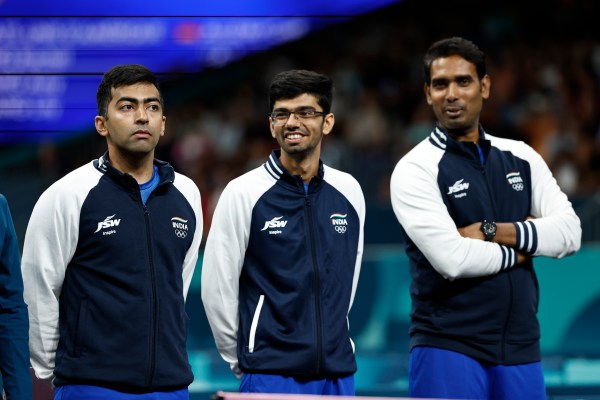The gulf in class was clearly visible as the Indian men’s team was blanked 3-0 by Chinese Taipei in the semifinal of the Asian TT Championships in Astana on Thursday.
While their win over Kazakhstan in the quarterfinal the previous day confirmed a medal for India, they couldn’t up their game against the Taipei side led by World No. 11 Lin Yun-Ju.

Despite the loss, confirming their third successive medal at the Asian Championships — they clinched bronze at the 2021 and 2023 editions — is a huge deal but the Indian team, led by veteran Sharath Kamal, will have to deeply ponder how they can raise their game to a level where they can compete with the best in Asia. Mind you, the Taipei side is easily among the top 4 in Asia after China, Japan, and Korea.
While the technique of putting the ball back onto the table no matter the return is a common thread, the Indian women have managed to beat top players, using their pimpled rubbers to outsmart their opponents while also working tirelessly on their fitness and forehand attacks. In contrast, the men’s game is based on sheer power and speed where agility is key.
Former India player Aman Balgu, who currently coaches Manika Batra said that the top international players are supremely fit and that’s one of the key differences.
“If you see the top players, they bend a lot more, staying lower to the table. It’s not always the case with our players. In order to do that consistently, you need immense fitness and I feel that’s definitely one area where if we improve, we can produce better results against top players.”
Against the Taipei team, there was a gulf in class in all three departments.
42-year-old Sharath opened the match against the very agile Yun-Ju. In terms of technique, Sharath’s wealth of experience is unmatchable. He has been the Indian men’s table tennis flagbearer for almost two decades and there’s little that he doesn’t know about the sport. Yet Yun-Ju, who won the WTT Champions in Frankfurt last year, was able to masterfully dominate him by moving him from side to side. Sharath just wasn’t able to match the pace and Yun-Ju’s down-the-line backhands were too much for him to handle.
 Paris: Harmeet Desai, Manav Thakkar and Sharath Kamal of India react during the Men Team Round of 16 Match between China and India of the Table Tennis competitions in the Paris 2024 Olympic Games, at The South Paris Arena in Paris, France, 06 August 2024. (EPA-EFE/RITCHIE B. TONGO VIA PTI)
Paris: Harmeet Desai, Manav Thakkar and Sharath Kamal of India react during the Men Team Round of 16 Match between China and India of the Table Tennis competitions in the Paris 2024 Olympic Games, at The South Paris Arena in Paris, France, 06 August 2024. (EPA-EFE/RITCHIE B. TONGO VIA PTI)
After losing the opening game 11-7, Sharath tried to force himself into the match by holding a lead in a second game, taking it to tie-breakers, but just couldn’t go over the line. He had a 2-point lead in the third game too, but was wasteful with his serves, giving Yun-Ju to opportunity to attack and take the match.
The only bright spark in the entire tie came from World No. 60 Manav Thakkar taking a game off World No. 22 Kao Cheng-Jui. Though he lost the match 3-1 (11-9, 8-11, 11-3, 13-11), barring the third game, he was always in the contest, even taking the fourth game to tie-breakers where he was unfortunate to concede a net point.
In what turned out to be the final match of the tie, Harmeet Desai was blown away by World No. 70 Huang Yan-Cheng 3-0 (11-6, 11-9, 11-7). Though Harmeet hasn’t been in the best of form, he was expected to give Yan-Cheng a good fight but the Taipei player had an answer to all of his attacks. Harmeet just wasn’t quick enough to respond to Yan-Cheng’s returns that fell to his backhand and was repeatedly punished.
Coach Massimo Costantini told The Indian Express from Astana that while he was pleased with the performance as a whole, he wants individual players to step up and get those big wins.
“Technically or tactically we did nothing wrong. We lost against a better team with better players. I’m happy with what we have achieved at this tournament though we all know that we have to improve. The way we will improve is by getting wins against top players.
“Manav was playing against a top-20 player but his opponent was actually a little scared of playing against him. That’s a good sign but it’s only if we get one big win is when we will continue getting big wins. That will come by playing together at more international tournaments,” the Italian said.
Manav told The Indian Express that by travelling and training as a unit, they’re slowly improving.
“We have team meetings every day where we review everything. That happened only sporadically earlier. It’s nice to get different perspectives because everyone here wants the other to improve and nobody points fingers at the other. It’s great because we know there’s always a team to back us no matter what.”










